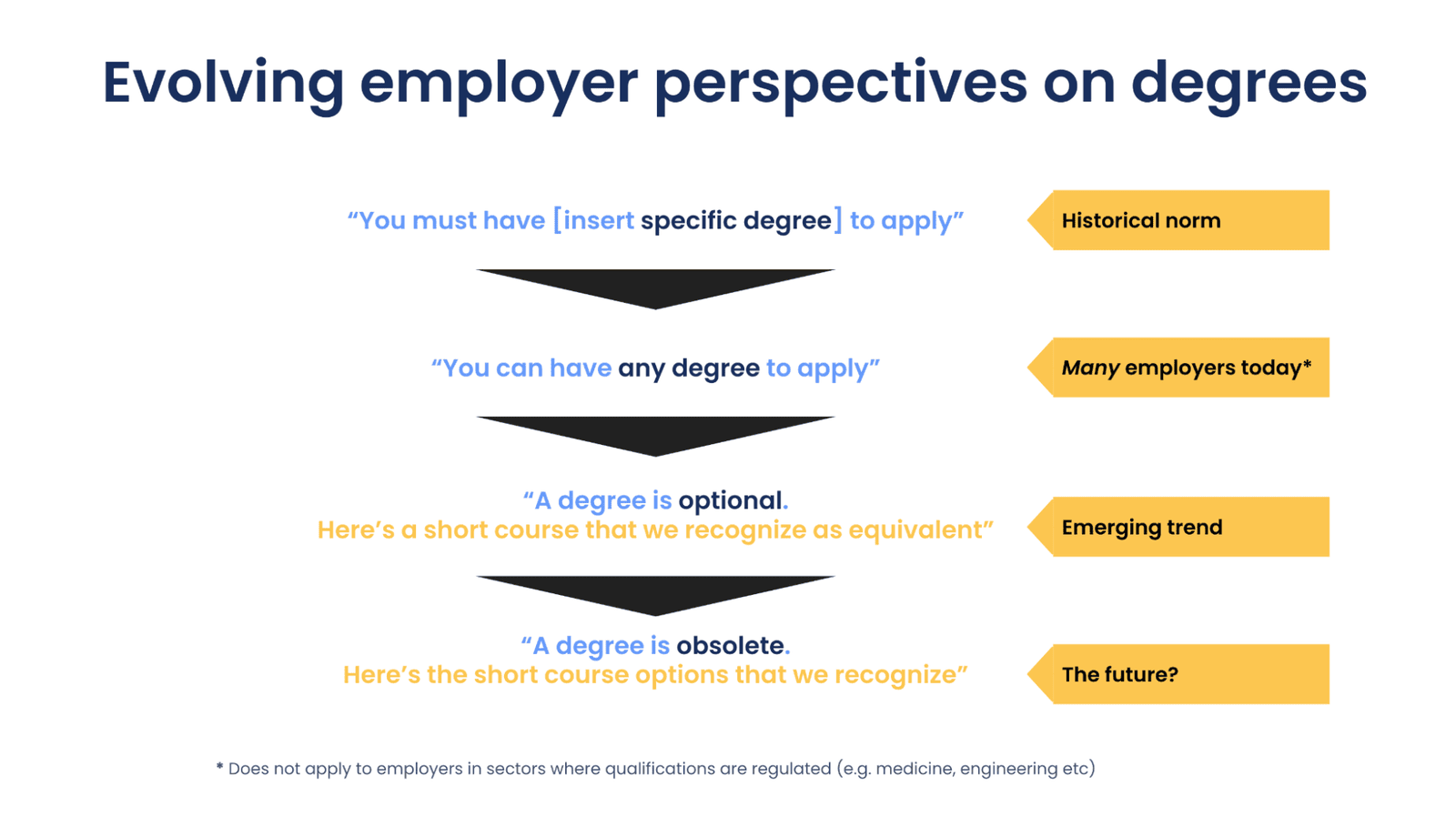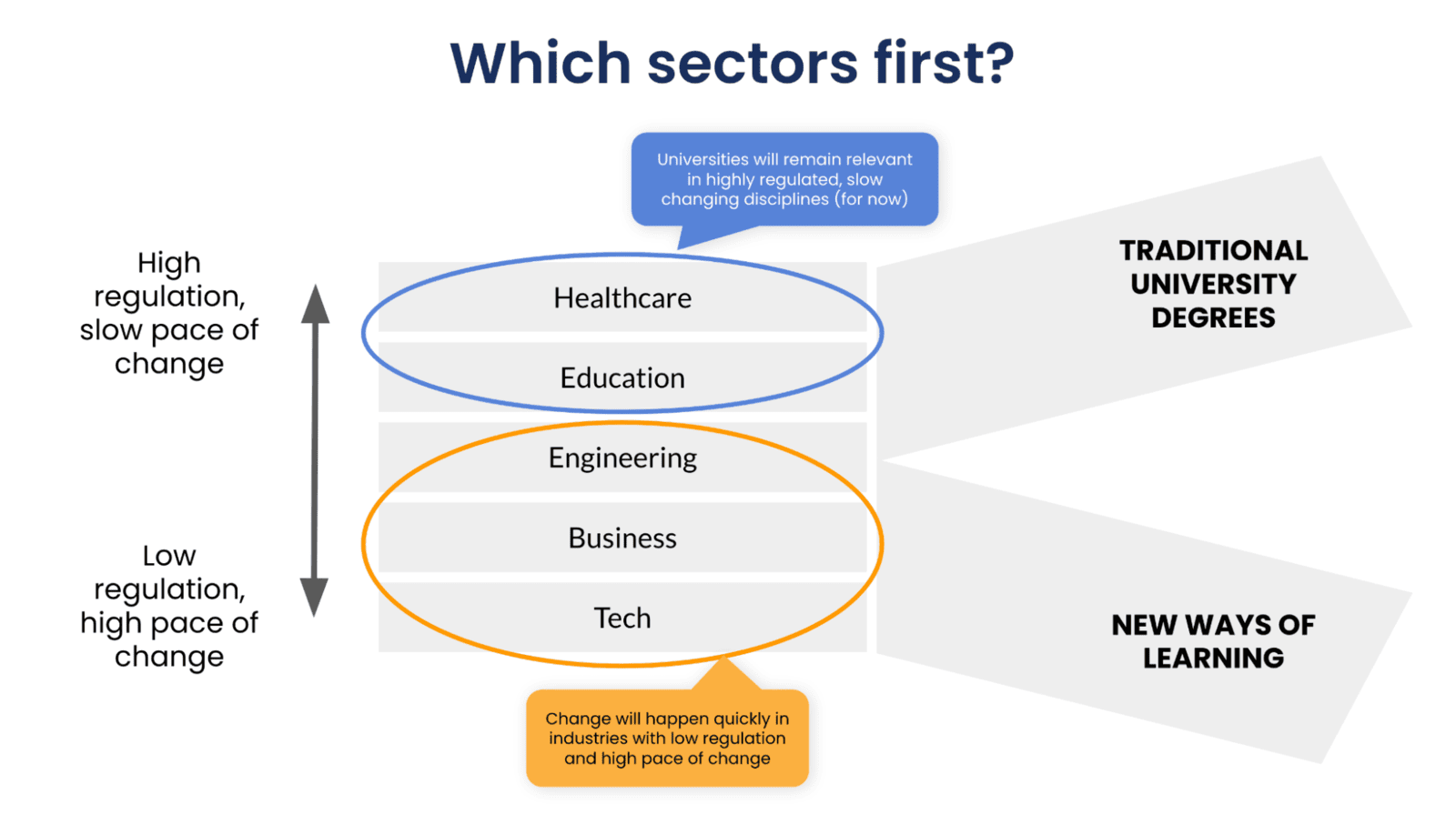
Jeffrey Duncan
Prosple Co-founder

In 2017, Google CEO Sundar Pichai introduced Grow with Google, a new hub for online education and learning. While many university leaders may not have taken note, they should have.
Google’s first offering was a certification course with a goal that was simple but profound. Google would teach candidates to become job-ready IT professionals — at scale, in under a year, and with no degree or prior experience needed.
For those seeking a doorway into the tech industry, this was exciting news. While online learning had been hot for the better part of a decade, no course had ever promised comprehensive job training backed by the prestige, expertise, and resources of one of the most successful companies on the planet.
But would Google follow through? The company remains infamous for ruthlessly abandoning once-promising ideas. Was Grow by Google another big splash destined to meet a similar fate?
No. Five years later, the program is a huge success.
Almost a million people have enrolled in the IT course so far. Google has added an advanced follow-up for those who want to learn Python and IT automation and now gives students the option to get certified in new areas like UX design, data analytics, and project management.
For just $39 a month and from anywhere in the world, you can earn a Google certificate in as little as three months. You’ll graduate with the knowledge and experience to apply for an entry-level position at Google or any one of over 150 other major employers — and a guarantee from Google that the company views a Google certificate as equal to a related university degree when making hiring decisions.
However, the implications of the program’s success go far beyond one company’s ambitions. Its popularity may well be the death knell of our traditional university system and the beginning of a new era, where work and learning are blended and employers take the lead in the training of their early career hires.
The Problem With Our Current University System
The Problem With Our Current University System
To understand the problem facing universities today, let’s start with a question. Why would Google bother to create its own massive education program in the first place?
The answer is that our current system is no longer delivering enough value. Both employers and students have long relied on the university experience to prepare grads for working life — and today, both find that proposition is coming up short.
For employers, the problem is simple. A university degree used to mean a new hire was almost certainly qualified to join a team and start contributing after no more than a short training period or onboarding. Too often, that’s not the case today.
Why? Many graduates no longer leave university equipped with in-demand job skills. Executives in fast-moving industries like tech, especially, are quick to observe that by the time a student finishes a four-year degree program, their knowledge base is already at least four years out of date.
Indeed, some employers are even starting to view traditional degrees as a negative. Many now prefer to hire scrappy overachievers who lack fancy credentials but can demonstrate real-world success. If you’re trying to build an innovative business with ambitious goals, would you rather bring on a business school grad who might make a brilliant manager at 2000s-era Hewlett Packard or a 23-year-old web 3.0 DAO founder? Assuming both had enough basic competencies, you’d probably choose the latter.
Now, this is partly because academia is struggling to keep up with a business environment that moves faster than ever. But it’s also because the quality of university credentials keeps being devalued.
A good university transcript doesn’t mean what it used to, because earning top marks has become significantly easier. The average student today spends roughly 30 per cent less time learning than her peers a half-century ago, while earning three times as many As.
In many cases, completing a degree has become less a mark of distinction and more a sign that you’re capable of simply doing the bare minimum. This is not exactly the stuff of hiring managers’ dreams.
Of course, there are two sides to this coin. If the value of a degree is falling for employers, then it’s falling for students as well.
Today, the basic university bargain for students — pay for an education, earn your degree, and get a good job that makes it all worthwhile — no longer holds up. Even as employers are increasingly less impressed by higher education, students are spending more than ever for their seat in class.
Over the last 50 years, the average cost of an American degree has increased by 2,700 per cent, or almost 5X the rate of inflation. In Australia, generous income-contingent deferred loans have not stopped students from feeling the pressure, with the average student’s loan burden almost tripling in the past 15 years.
That’s a LOT of money. And all to enter a job market that needs more from students than their education has equipped them to deliver? Small wonder so many are turning to alternatives — chief among them online learning.
Grow with Google is just one example. If you’ve got an internet connection and a little curiosity, you can access exponentially more information than was available inside even the largest university library of 1990 — and do it from your living room to boot.
You don’t have to go it alone, either. Today, students everywhere can learn from the best professors anywhere. Indeed, during the pandemic, millions have.
Want to understand how the economy works? Sign up for an online course in financial markets taught by a tenured professor at Yale — or watch YouTube videos posted by similarly credentialed experts.
Forget paying a fat tuition bill. All you need is a laptop.
Now some may argue that online instruction doesn’t compare to in-person learning, let alone the full university experience. They may be right! But if your primary goal is to get a good job, then a traditional degree may no longer be the best way to prove you’ve learned all the right things. Today, learning isn't expensive, but university credentials certainly are, and a traditional degree may just be the most expensive way imaginable to prove you know something.
So where does all this leave us? Headed into a future where work and learning are no longer separate, but blended — and universities are locked in a death spiral from which many will not emerge.
What the Future Could Look Like
What the Future Could Look Like
Grow with Google is just the beginning. More companies will follow suit — abandoning their exclusive reliance on universities in favour of valuing direct skills training that prepares new hires to jump in and contribute right away.

By necessity, traditional degrees will become less popular. Instead, students will combine online education with work experience, continuously levelling up their skills while on the job.
Think of it as a credentials stack. As a post-secondary student, you may start out taking a course in Python and use that to get yourself an entry-level coding job. The course is developed and kept up-to-the minute relevant by a consortium of leading tech employers (who rely on it for recruiting and screening their early-career talent).
Soon, you supplement that with another course in Javascript. Then maybe you venture further afield with a certification in project management. A few years down the road, you take an online class in leadership from the Wharton School of Business and put your newfound knowledge to work when you’re promoted to a manager role.
If each of these courses follows the Google model, you’d be looking at about 2 years' worth of total training. But you’d do it in digestible, bite-sized chunks of 5-10 hours a week, often while quickly integrating your new skills into your everyday work. Much, if not all of your learning, would also be paid for by your employer (which will be able to leverage the power and scale of online instruction to do so at a per person cost that is far less than the expensive corporate traineeships of yesteryear).
All of these skills would become badges held in your verified credentials wallet, which you build on during the course of your career. For both job seekers and those already employed, this approach will encourage continuous, lifelong learning while rewarding those who put in the time to continually grow and develop. Employers, meanwhile, will be able to source talent with greater confidence, and in many cases, simplify their hiring processes.

This won’t happen all at once; you don’t need to worry about an online degree hanging proudly on the wall at your next doctor’s appointment. But for many sectors, this is a more efficient way to bring new skilled labour into the workforce quickly. The software industry has already demonstrated its indifference to degrees, so if history is anything to go by, other industries will follow.
So where does this leave universities? Many will try to adapt with cheaper and more flexible online offerings. Some may choose to partner with major employers to create highly regarded certification courses (imagine, say, a Stanford-Meta program to train aspiring coders) that will further broaden their reach.
But for those who choose to carry on much as before will quickly find the maths just doesn’t add up. How many students will choose to take on piles of debt to graduate with a credential that employers regard as obsolete? It asks no great leap of imagination to suggest that the answer will be fewer and fewer.

